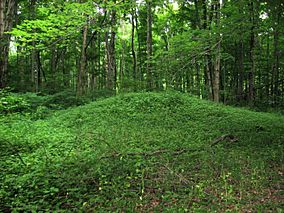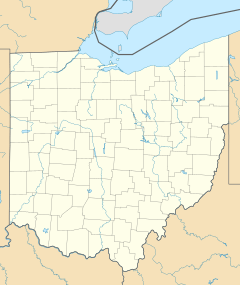Glen Helen Nature Preserve facts for kids
Quick facts for kids Glen Helen Nature Preserve |
|
|---|---|

The Orators Mound, an Adena mound in the Glen
|
|
| Location | Greene County, Ohio |
| Nearest city | Yellow Springs |
| Area | 1,004 acres (406 ha) |
| Established | 1929 |
| Owner | Glen Helen Association |
| Designated: | 1965 |
The Glen Helen Nature Preserve is a special place for nature lovers. It's a large nature reserve located right next to Yellow Springs, Ohio, in the United States. This beautiful area was given to Antioch College in 1929 by Hugh Taylor Birch. He donated it in memory of his daughter, Helen Birch Bartlet. It's the biggest private nature preserve in this part of Ohio.
Discovering Glen Helen Nature Preserve
The Glen Helen Nature Preserve covers a huge area of 1,004 acres (406 ha). It sits right next to the main campus of Antioch College. This preserve is part of an even larger natural area. It connects with the 752 acres (304 ha) John Bryan State Park and the 268 acres (108 ha) Clifton Gorge State Nature Preserve. Together, these areas create a long river corridor of over 2,000 acres! The Ohio Department of Natural Resources has called this whole area "exceptional." This is because of how clean it is and how many different kinds of plants and animals live there. In 1965, Glen Helen was even named a National Natural Landmark.
A Changing Landscape
The land that makes up Glen Helen has been used in many ways over time. Some parts have always been wild and natural. Other areas were once farms, or used for grazing animals, or had their trees cut down. Some of the oldest trees in the Glen are about 400 years old! But many parts of the forest are much younger, around 90 years old or less.
The people who manage the Glen work hard to keep it healthy. They remove plants that don't belong there, called "invasive species." These include plants like bush honeysuckle and Japanese stiltgrass. They clear about 30 to 40 acres of honeysuckle every year. After clearing, they plant native species. These are plants that naturally grow in Ohio, like spicebushes, sumac, goldenrod, and sedge. This helps the land return to its original, healthy state.
Exploring the Glen's Features
Glen Helen has more than twenty miles of trails that you can explore. It also includes 2.5 miles of the Little Miami River. This river is part of the National Wild and Scenic Rivers System, which means it's very special. You can find old-growth forests here, which are very old and untouched. There's also a cool rock column called Pompey's Pillar.
The preserve also has areas that were once farmland but have been brought back to nature. You can visit the Orators Mound, which is an ancient Hopewell burial mound. And don't forget the Yellow Spring itself! This natural spring is so famous that the town of Yellow Springs is named after it.
Learning and Community at the Glen
For many years, Glen Helen was like a living classroom for Antioch College. Students and teachers used it for research and learning about nature. It also offered many programs for the public in the wider Miami Valley area.
A group called the Glen Helen Association (GHA) has always supported the Glen. This "friends" organization started in 1960. They worked hard to save the Glen from a proposed highway and a sewer line. The GHA officially became a nonprofit group in 1979. Their main goal has always been to help and support Glen Helen.
A New Chapter for Glen Helen
In March 2020, Antioch College closed Glen Helen to the public because of the COVID-19 pandemic. The college later said it couldn't afford to keep supporting the preserve. But the Glen Helen Association stepped up! On June 10, 2020, an agreement was made to transfer ownership of the Glen to the GHA. The transfer was completed on September 4, 2020.
The GHA is now working hard to raise money. They want to hire staff again, reopen all parts of the Glen, and restart educational programs. They also need to fix up buildings and grounds. The trails are now open from dawn to dusk, but some buildings are still closed. The GHA is doing a great job making sure Glen Helen stays open for everyone to enjoy!
Glen Helen Facilities
The Glen Helen Nature Preserve has several buildings and centers that help with its mission of education and conservation.
Glen Helen Raptor Center
The Glen Helen Raptor Center is a special place that helps injured birds of prey. These birds, like hawks, owls, and falcons, are called raptors. The center works to heal them and then release them back into the wild. They also teach people about raptors and how important they are to Ohio's natural environment.
Vernet Ecological Center
The Vernet Ecological Center is located on the western side of the Glen. It's named after Sergius Vernet, who invented a special wax part used in thermostats. This building has an auditorium with a stage and sound system, perfect for presentations. It can seat up to 140 people. There's also a patio, a Nature Shop where you can buy souvenirs, and offices. The Atrium Gallery inside shows art by local artists. The building was built in 1973 and was updated in 2012 with energy-saving features like a geothermal heating system.
Trailside Museum
The Trailside Museum is the welcome center for Glen Helen on weekends. It's a fun place with hands-on displays and exhibits. You can learn more about the Glen and its wildlife here.
Glen Helen Outdoor Education Center (OEC)
The Outdoor Education Center (OEC) is in the northeast part of the preserve. This center hosts school groups and other organizations. They offer programs that help young people learn to appreciate nature. They also teach about environmental problems and how nature works. The OEC has a lodge with a dining room that can feed up to 120 people. It also has three dormitories, each sleeping 36-40 people.
Camp Greene
Camp Greene used to be a Girl Scout Camp. It added about 30 acres to the Glen in 2015. It has a lodge built in the 1920s that can hold up to 200 people. There are also dormitory facilities here.
Birch Manor
Birch Manor is a large house built in 1931. It was designed by architect William Shilling. This was the home of Hugh Taylor Birch, the person who donated the first 700 acres of the preserve. He lived there seasonally for ten years. The house originally had 11 rooms, nine bathrooms, and eight fireplaces. Later, more rooms were added, bringing the total to 18. Today, Birch Manor is a beautiful place that can be rented for special events. It can host up to 150 people outdoors or 110 people indoors.
Many of the Glen Helen facilities, including the Vernet Ecological Center, the Outdoor Education Center Lodge and Dormitories, Camp Greene, and Birch Manor, can be rented for special events like parties or meetings.
The Riding Centre
The Riding Centre is a facility that offers therapeutic horse riding. It's located on land leased from Glen Helen, but it's operated as a separate organization.
 | Bessie Coleman |
 | Spann Watson |
 | Jill E. Brown |
 | Sherman W. White |


